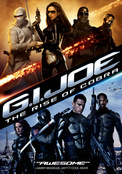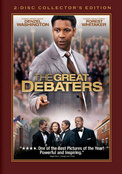Movie Review Library - G
|
Home
/ Latest Reviews / Review
Library |
Make sure you see the Latest Video Reviews page as well!
 |
|
 |
The Game (1997) |
 |
Game of Death (USA /
Hong Kong - 1978) |
 |
Game Over - Kasparov and the Machine (2003) |
 |
Gamera 3: The Awakening of
Iris
(Japan - 1999) Starring: Yukijiro Hotaru, Shinobu Nakayama, Ayako Fujitani Director: Shusuke Kaneko Plot: Gamera (the monstrous flying turtle) is back, fighting his nemeses the Gyaos. But this time he must also face the new challenge of Isis, a monster brought back to life by a girl bent on revenge. Review: Though Gamera was originally created as a kid's version of Godzilla, the recent film adventures have been anything but infantile. Great special effects, decent acting, and good direction go hand-in-hand with an interesting story-line. This latest offering ups the ante with two impressive pyrotechnic sequences of urban destruction as the monsters battle it out. This time, the camera captures the huge casualties such battles incur, and adds a bit of reality not normally seen in this type of movie. Of course, parts of the story remain silly, and some of the interesting plot points are left in the air, but as far as monster movies go, this is one of the best. Entertainment: 7/10 |
 |
Gangs of New York (2002) |
 |
Gaz Bar Blues (Quebec - 2003) |
 |
The General's Daughter (1999) |
 |
Gen-X Cops
(Hong Kong - 1999) |
 |
Gerry (2003) |
 |
Get Carter (2000) |
 |
Get Shorty (1995) |
 |
Get Smart (2008) |
 |
Ghostbusters (1984) |
 |
Ghost Dog: the
Way of the Samurai (1999) |
 |
Ghosts of the Abyss (2003) |
 |
Ghost in the Shell
(Japan - 1995) |
 |
Ghost in the Shell: Stand Alone Complex - Solid State Society
(Japan - 2006) |
 |
Ghost Rider (2006) |
 |
Ghosts of Mars (2001) |
 |
The Gift (2000) |

|
G.I. Joe: The Rise of Cobra (2009) |
 |
Ginger Snaps (2000) |
 |
The Gingko Bed
(Korea - 1998) |
 |
Girlfight (2000) |
 |
Girl, Interrupted (1999) |

|
The Girl with the Dragon Tattoo (2011) |
 |
Gladiator (2000) |
 |
Glory (1989) |
 |
Go (1999) |
 |
The Godfather Part III (1990) |
 |
God Of Cookery (Hong Kong - 1996) |
 |
God
of Gamblers
(Hong Kong - 1989) |
 |
The Goddess of 1967 (2000) |
 |
*Classic* The Godfather (1972) |
 |
Godzilla (1998) |
 |
Godzilla 2000 (Japan - 2000) |
 |
Godzilla Against Mechagodzilla
(Japan - 2002) |
 |
Godzilla: Tokyo S.O.S. (2003) |
 |
Golden Chicken (Hong Kong - 2002) |
 |
The Golden Compass (2007) |
 |
GoldenEye (1995) |
 |
Gone in 60 Seconds (2000) |
 |
Gone With the Wind (1939) |
 |
The Good, the Bad and the Ugly (1966) |
 |
The Good German (2006) |
 |
Good Night, and Good Luck. (2005) |
 |
The Good Shepherd (2006) |
 |
Good Work (Beau Travail) (1999) |
 |
A Good Year (2006) |
 |
The Goonies (1985) |
 |
Gorgeous
(Hong Kong - 1999) |
 |
Gorillas in the Mist (1988) |
 |
Gosford Park (2001) |
 |
Gothika (2003) |
 |
Goya's Ghost (2006) |
 |
La Grande Séduction (Quebec - 2003) |
 |
Grave of the Fireflies
(Japan - 1988) |
 |
The Great Debaters (2007) |
 |
The Great Escape (1963) |
 |
*Classic* Greed (1925) |
 |
The Green Mile (1999) |
 |
The Green Slime (1968) |
 |
Green Street Hooligans (2005) |
 |
The Grey Zone (2001) |
 |
Grosse Pointe Blank (1997) |
 |
Groundhog Day (1993) |
 |
The Grudge (2004) |
 |
Guarding Tess (1994) |
 |
Gunmen (Hong Kong - 1988) |
 |
Guns and Talks (South Korea - 2001) |
 |
The Guns of Navarone (1961) |
 |
The Guys (2002) |
|
Home
/ Latest Reviews / Review
Library |